The Burial – Courtney Collins (Allen & Unwin)
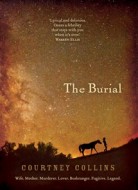 Based on the real-life story of bushranger and outlaw Jessie Hickman and set in the first decades of the 20th century, this exotic and earthy novel tracks Jessie’s escape first from her abusive husband and then from the men who come after her in pursuit. Circus rider, horse whisperer, cattle rustler, gang member, jailbird, mother and murderer, Jessie goes by several aliases and uses her bush skills in an increasingly desperate flight through the mountainous bushland of New South Wales. Pursued by lawless men bent on vengeance as well as by two more who harbour deep and complex feelings about her, Jessie is also haunted by her own most recent and most grisly crimes.
Based on the real-life story of bushranger and outlaw Jessie Hickman and set in the first decades of the 20th century, this exotic and earthy novel tracks Jessie’s escape first from her abusive husband and then from the men who come after her in pursuit. Circus rider, horse whisperer, cattle rustler, gang member, jailbird, mother and murderer, Jessie goes by several aliases and uses her bush skills in an increasingly desperate flight through the mountainous bushland of New South Wales. Pursued by lawless men bent on vengeance as well as by two more who harbour deep and complex feelings about her, Jessie is also haunted by her own most recent and most grisly crimes.
Part historical novel, part Australian Gothic, The Burial uses the story of the ‘lady bushranger’ to explore some of the dilemmas in the life of a rebellious woman living in a time and place where the choices for women were few, and some of those choices were violent or heartbreaking or both. Collins sustains the suspense and the emotional intensity of this tale from beginning to end. It’s a harrowing read and a wild ride.
Read an extract from The Burial here
Read the Stella Interview with Courtney Collins here
About Courtney Collins
Courtney Collins grew up in the Hunter Valley in NSW and now lives on the Goulburn River in regional Victoria. The Burial is her debut novel and rights have been sold in the US, and it has been optioned for film. Her current work in progress, The Walkman Mix, received a Lord Mayor’s Creative Writing Award in 2011.
Questions of Travel – Michelle de Kretser (Allen & Unwin)
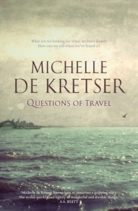 Following two very different characters in parallel as their lives move closer together along very different paths, this ambitious novel is a prolonged meditation on the meaning of travel, and on the ways in which humanity has learned to negotiate time and space in the 21st century, and the part played by the internet in the altered ways we now think about communication and travel. It follows the life of Australian Laura, who lives a restless, rootless existence with no meaningful family ties or strong attachment to place, and of Sri Lankan Ravi, whose life is quite the opposite, and indeed has such an excess of meaning that it spills over into unimaginable violence and bewildering exile.
Following two very different characters in parallel as their lives move closer together along very different paths, this ambitious novel is a prolonged meditation on the meaning of travel, and on the ways in which humanity has learned to negotiate time and space in the 21st century, and the part played by the internet in the altered ways we now think about communication and travel. It follows the life of Australian Laura, who lives a restless, rootless existence with no meaningful family ties or strong attachment to place, and of Sri Lankan Ravi, whose life is quite the opposite, and indeed has such an excess of meaning that it spills over into unimaginable violence and bewildering exile.
The novel pays particular attention to such contemporary concerns as Australia’s treatment of asylum seekers, and as the neoliberal attitudes and values that have crept into most areas of working life. Its wry, low-key wit is something that her fans will recognise from earlier novels. As with all accomplished novels of ideas, de Kretser uses her articulate, thinking characters as vehicles for her contemplation and intellectual dissection of the world.
Read an extract from Questions of Travel here
Read the Stella Interview with Michelle de Kretser here
About Michelle de Kretser
Michelle de Kretser was born in Sri Lanka and emigrated to Australia at fourteen. She is the author of The Rose Grower; The Hamilton Case, which won the Commonwealth Writers’ Prize (SE Asia and Pacific region) and the UK Encore Prize; and The Lost Dog, whose awards include the 2008 NSW Premier’s Book of the Year Award, the Christina Stead Prize for Fiction, and the 2008 ALS Gold Medal.
The Sunlit Zone – Lisa Jacobson (Five Islands Press)
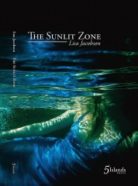 This original and surprising book combines two genres rarely seen out together: speculative fiction and the verse novel. Set on the east coast of Australia between 2020 and 2050, the novel uses recognisable settings and familiar characters to represent a world in which technology may change the daily texture of human life but human character doesn’t change much at all. Jacobson imagines a world that is radically different from ours in some ways but in others disconcertingly the same; love stories and family tragedies alike have the same qualities as the ones we all know, as do the experiences of loss and recovery.
This original and surprising book combines two genres rarely seen out together: speculative fiction and the verse novel. Set on the east coast of Australia between 2020 and 2050, the novel uses recognisable settings and familiar characters to represent a world in which technology may change the daily texture of human life but human character doesn’t change much at all. Jacobson imagines a world that is radically different from ours in some ways but in others disconcertingly the same; love stories and family tragedies alike have the same qualities as the ones we all know, as do the experiences of loss and recovery.
In loosely structured verse, Jacobson uses the conversational voice of her narrator North to evoke the power and beauty of the ocean and to produce a casual-seeming style that belies the amount of craft and care in the writing. The imagery is vivid without being mannered and the voice is rhythmical without being formal. This book shows how fine the distinction can be between technological change and magic realism when North’s sister Finn is revealed as a hybrid creature who could be either a genetic mutant or a creature from a Greek myth.
Read an extract from The Sunlit Zone here
Read the Stella Interview with Lisa Jacobson here
About Lisa Jacobson
Lisa Jacobson is a widely published writer of poetry and fiction, who won the 2011 Bruce Dawe National Poetry Prize. She is an Honorary Research Fellow at La Trobe University. The Sunlit Zone was shortlisted for the 2009 Victorian Premier’s Literary Award for an unpublished manuscript.
Like a House on Fire – Cate Kennedy (Scribe)
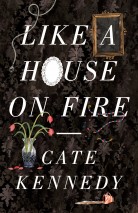 Like a House on Fire is a substantial book that maintains its quality from start to finish, with no slight or weak stories added to make weight. Kennedy is well known as one of the country’s best practitioners of the form and these fifteen strong and vivid stories do not disappoint, each of them showing her instinctive feel for the shape and pace of a short story. Kennedy is a realist writer who writes of ordinary people’s lives and feelings in the here and now, and her characters and their dilemmas are immediately recognisable and sometimes even uncomfortably close to home.
Like a House on Fire is a substantial book that maintains its quality from start to finish, with no slight or weak stories added to make weight. Kennedy is well known as one of the country’s best practitioners of the form and these fifteen strong and vivid stories do not disappoint, each of them showing her instinctive feel for the shape and pace of a short story. Kennedy is a realist writer who writes of ordinary people’s lives and feelings in the here and now, and her characters and their dilemmas are immediately recognisable and sometimes even uncomfortably close to home.
While alert to the darker side of life, Kennedy also focuses on the small moments of revelatory tenderness that can redeem even a toxic situation, as with the mother-and-child moments in ‘Ashes’ and ‘Five-Dollar Family’. She explores unorthodox relationships that stretch the boundaries of daily life, like the hospital cleaner with the elderly patient in ‘Laminex and Mirrors’, or the strange moments of family truce, as with the complicit sisters wrecking the family photo in ‘Whirlpool’. The stories in this collection have a strong family relationship that makes the book seem more that just the sum of its parts; it’s as though the various characters from the different stories could pass each other in the street every day.
Read an extract from Like a House on Fire here
Read the Stella Interview with Cate Kennedy here
About Cate Kennedy
Cate Kennedy is a prizewinning short-story writer, who has published two collections, Dark Roots and Like a House on Fire. She is also the author of a novel, The World Beneath; a travel memoir, Sing, and Don’t Cry; and the poetry collections Joyflight, Signs of Other Fires andThe Taste of River Water, which won the Victorian Premier’s Literary Award for Poetry in 2011.
Sea Hearts – Margo Lanagan (Allen & Unwin)
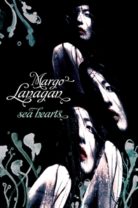 Margo Lanagan’s wonderfully imaginative and lyrical novel creates a world that seems half-familiar: wild Rollrock Island, from which the original bold red-headed women have disappeared and in their place are the quiet, dark and slender seal-wives, the women whom the witch Misskaella has drawn by magic, fully grown, from the hearts of seals to please the bewitched men of the island. Unlike the human wives they have replaced, these seal-women are submissive, obedient and always sexually compliant. But Misskaella’s magic has been a form of revenge for the way she was treated by men when she was young; over the years, the seal-wives produce children who of course are also not fully human, and when their mothers begin to pine for their old lives and their true home, the hybrid chickens come home to roost.
Margo Lanagan’s wonderfully imaginative and lyrical novel creates a world that seems half-familiar: wild Rollrock Island, from which the original bold red-headed women have disappeared and in their place are the quiet, dark and slender seal-wives, the women whom the witch Misskaella has drawn by magic, fully grown, from the hearts of seals to please the bewitched men of the island. Unlike the human wives they have replaced, these seal-women are submissive, obedient and always sexually compliant. But Misskaella’s magic has been a form of revenge for the way she was treated by men when she was young; over the years, the seal-wives produce children who of course are also not fully human, and when their mothers begin to pine for their old lives and their true home, the hybrid chickens come home to roost.
This book is classified as fantasy for a ‘Young Adult’ or ‘Crossover’ readership, but it transcends any such attempt to pigeonhole it; it’s not really mainstream fantasy, and it’s a compelling read for adults, full of ideas about human desire and human weakness that are deeply woven into the fabric of the story. Lanagan uses the old Scottish, Irish and Icelandic myth of the selkies, the magical shape-changing creatures who were seals in the water and humans on the land, to write a story that is among other things a feminist fable about the inherent inequality in the traditional notion of a desirable marriage, and an exploration of what happens to a society over time when it’s cut off from the rest of the world.
Read an extract from Sea Hearts here
Read the Stella Interview with Margo Lanagan here
About Margo Lanagan
Margo Lanagan is an internationally acclaimed writer of novels and short stories. Her first collection, Black Juice, won two World Fantasy Awards and the Victorian Premier’s Award for Young Adult Fiction. Her second collection, Red Spikes, won the CBCA Book of the Year: Older Readers. Her novel Tender Morsels won the World Fantasy Award for Best Novel.
Mateship with Birds – Carrie Tiffany (Picador)
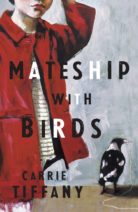 Mateship with Birds is a deceptively gentle-looking novel whose calm surface belies its many sharp and frank observations about the world. Set in country Victoria in the 1950s, it follows the fortunes of two people whose loneliness is offset by the many active strands of their daily lives: Harry, whose wife has left him for somebody else, and Betty, whose two children have no visible father. Tiffany uses the two main characters’ interactions with each other and with a small supporting cast to show the intricate interrelations not only between people, but also between human life and the natural world. There’s complex interdependence among species, and human behaviour is reflected in even the smallest, most attentively observed details of the lives of animals and birds.
Mateship with Birds is a deceptively gentle-looking novel whose calm surface belies its many sharp and frank observations about the world. Set in country Victoria in the 1950s, it follows the fortunes of two people whose loneliness is offset by the many active strands of their daily lives: Harry, whose wife has left him for somebody else, and Betty, whose two children have no visible father. Tiffany uses the two main characters’ interactions with each other and with a small supporting cast to show the intricate interrelations not only between people, but also between human life and the natural world. There’s complex interdependence among species, and human behaviour is reflected in even the smallest, most attentively observed details of the lives of animals and birds.
The interconnectedness of all things is also the force behind Tiffany’s other artforms: as well as writing novels she makes small, delicate sculptures and collages in which objects and fragments are juxtaposed in beautiful and surprising ways. Her skills in the meticulous piecing-together of fragments are apparent in this novel, where she uses several different kinds of text – letters, homework, nature notes — to weave a single strong narrative. The novel’s title is borrowed from a 1920s bird-watching book, but in the context of this novel it takes on subtle other meanings. For the book is, above all, about sex and desire: ‘mateship’ here is translated from its familiar Australian meaning into a word for the practice and the art of mating, whether in the lives of humans, animals or birds.
Read an extract from Mateship with Birds here
Read the Stella Interview with Carrie Tiffany here
About Carrie Tiffany
Carrie Tiffany was born in West Yorkshire and grew up in Western Australia. Her first novel, Everyman’s Rules for Scientific Living, was shortlisted for the Orange Prize, the Miles Franklin Literary Award, the Guardian First Book Award and the Commonwealth Writers’ Prize, and won the Dobbie Award for Best First Book and the WA Premier’s Award for Fiction. Mateship with Birds is her second novel.

